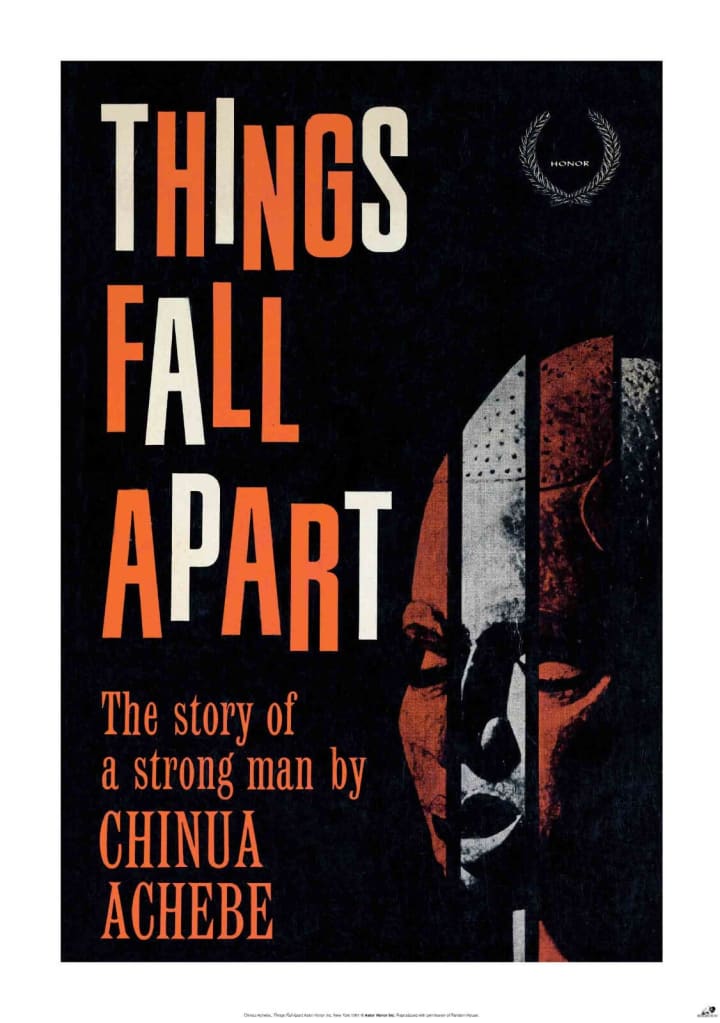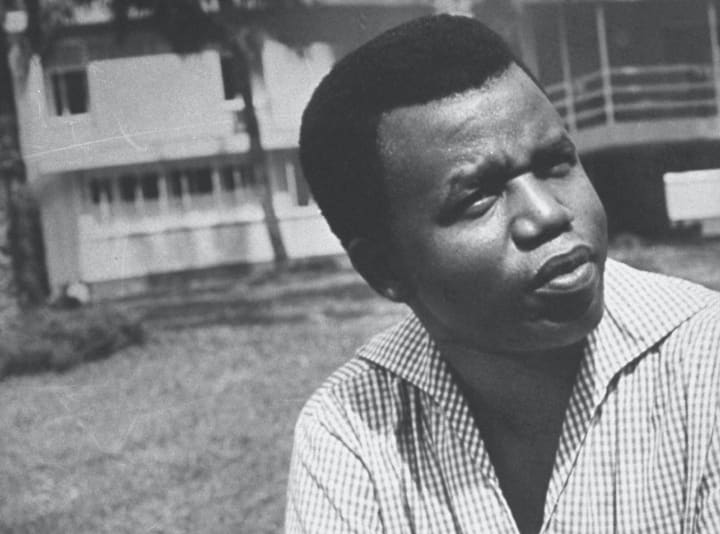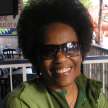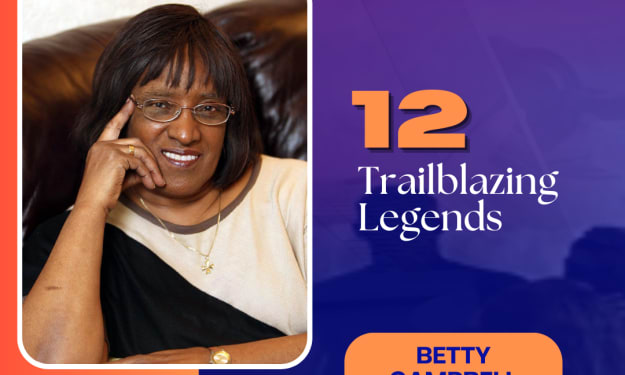The Magic Of Chinua Achebe: An Anniversary Tribute
In praise of a genius writer

The Nigerian writer, Chinua Achebe, was born this day in 1930. I wanted to celebrate this anniversary in some way, because I owe him beyond measure for not only understanding and appreciating my past, but making my impact on the present.
I have always loved reading, and became voracious in my appetite for books from as early as I could remember - four years old, to be precise. The trouble was that I had very few books to read - none at home, in fact - because my mother could not afford them. In short, there was little visual stimulation to help develop my obvious aptitude for the printed word. But I read anything I could see around me as I became increasingly fascinated with words: posters, adverts and any pamphlets lying around.
As a clever precocious child I daydreamed a lot about living a better life in the future, being rescued from my dire situation by some rich fantasy character: a world that was being gradually opened and solidified by books. In my deprived home I might have had love in abundance from my mother, perhaps as compensation for our lack of a father, but I was pretty short on most things, including school lunches, which I often had to forfeit when there was just no money to buy any, and there was no such luxury as a free school lunch!
Sometimes it was sheer torture watching other children eating around me, while I pretended not to be hungry. I didn’t want to make my Mum feel worse by staying at home when she had no money, as I also loved learning, so I cheerfully went to school telling her I would be fine as other kids would help me. I was told I had a reading age of 12 when I was only seven years old, and came to see education as my way out when I passed my 11+ to attend a convent school.
Hearing my story being read by the teacher one day in class led to many unexpected surprises, and the unwavering belief that education was the key to a confident and fulfilling existence. With the vision of passing on the benefits of learning to others, and instilling its importance whenever I could, I became a teacher of English and Literature in secondary schools, teaching mainly 12-18 year old students. I enjoyed it immensely, and made my way rapidly up the promotion ladder.
The early ’80s saw me teaching in Oxford, England, at a comprehensive school with pretensions to grammar status, as well as being a pastoral manager for a large year group of students. It had been a major promotion for me and my enthusiasm was boundless. However, despite the lack of literature relating to Black lives and experiences, there being no books celebrating Black culture outside of London, I didn’t know when I took up my appointment that this new job would change my life dramatically in a variety of ways, or a Black author would be instrumental in my making such an unexpected impact on others.
When I left my previous school, a colleague had given me a copy of Arrow of God by Chinua Achebe as a leaving present. With me being Black too, I guessed my friend thought I would appreciate it even more. Written in 1964, Arrow of God was a kind of fly-on-the-wall detached observation of a conflicted, colonial society heading for tragedy. It was the last part of a series known as the "The African Trilogy" which started with Things Fall Apart (1958) and included No Longer at Ease (1960). Achebe himself, who was born in Nigeria, had an amazing literary career spanning many decades during his 82 years, establishing a unique position as the author of Africa’s most widely read, translated and studied novel, among many other achievements. His writing was heavily influenced by his traditional Igbo culture, politics, gender issues, history and and post-colonial Christianity. Often referred to as the “Father of African Literature”, he was the model for aspiring writers who followed in his footsteps. .
However, I had never even heard of the author, or this book, despite his fame elsewhere, because there were few Black teachers in British schools, and even fewer minority authors on the taught syllabus, until a British publisher decided to release a groundbreaking African series to give the most popular authors some exposure.
I was smitten from the first few pages and cannot remember when I was so engrossed in any book, especially on a personal level, as though I was transported right back to my roots in Africa. Suddenly some of the cultural aspects in Jamaica made sense through this book, even though I wasn’t sure what part of Africa my father’s ancestry hailed from, having come to Jamaica as slaves and been given British names from their owners. Achebe’s book was a social and spiritual revelation for me and I promised myself to spread the word about his works as much as I could.
So here I was in 1985, the only Black teacher - and manager - in this virtually all-White school in Oxford. It was a baptism of fire, because I got the resentment and racism from all sides: from some of the other teaching staff, who resented a Black manager (especially when my male deputy was passed over for my post and undermined me, despite being paid more than I was!); from the male staff who resented a female manager - the only one in the school, apart from the deputy head, and, worst of all, from the White parents who thought I had a nerve teaching their children English - and giving them any low grades - when I wasn’t White or English, never mind my qualifications! It really was not a happy time for this Black teacher then. But back to Mr Achebe.

Exam Blues
Getting Arrow of God coincided with a new international writers option being introduced into Oxfordshire’s Year 12 Advanced Level syllabus. Not surprisingly, I couldn’t wait to teach the novel alongside Jane Austin’s Emma, which afforded a lot of comparisons in style, social norms, personal imperatives, and the colonial-British connection between the two books.
However, the reception of Achebe by the all-White student class was not good, to put it mildly. At the start of the course in the first year they complained bitterly about the ‘funny names’ they couldn’t pronounce; they were constantly asking what Africa had to do with England, they found it very hard to read, they said, constantly - despite its easy and enveloping narrative - and they resented it being taught. Period.
They were also sure that they would fail this part of their course. Why couldn’t they do predictable options like all the other schools, they wailed. I was very disappointed in their reaction, my enthusiasm rapidly dissipating, but I persevered, unbending, remembering my own colonial childhood where I was taught only English works, whose authors bore little resemblance to me.
Gradually, when they saw that I wasn’t going to budge, they threatened to change their options as well. I continued to coax and cajole while they quietly complained, but continued to read, nonetheless. Gradually the resistance started to fade as a few months into that first year, they began to see connections and similarities in the cultures and got used to the names. They also began to read his other books on their own initiative, going quietly to the library to read or consult Achebe’s other works without telling me, perhaps feeling sheepish about their earlier resistance. By the end of that year, they were discussing Arrow of God with a fluency and confidence that would have been unthinkable at the beginning, though they still fretted about how they were going to perform in their exams, considering themselves as virtual ‘guinea pigs’ for this option.
At the end of the second year, in 1987, my A-Level exam group performed the best in English Literature in the whole of Oxfordshire county for that section of the syllabus. We were the only school to have done something entirely different among the options, and the students excelled. They all came back to thank me profusely for introducing them to Achebe, and for my resilience in keeping with them. I gladly shared their joy and accomplishment, the heartache of those early months soundly forgotten, despite the times when I almost gave up. On top of that, I was specially commended by the Director of Education for Oxfordshire at that time - a rare occurrence - which restored my faith somewhat, and lessened the pain of what I had to endure to reach that moment of vindication.

Appreciation and all that
During all this time, one student stood out with her smile, quietness and early acceptance of the situation - Fiona, one of the leaders of the class. She did extremely well in her results, getting an A, and her smile was even broader when she saw her grade. But she made no comment about it, despite her look of gratitude.
Six months later, I decided to leave the school to take up full time writing and got a letter postmarked from Norway. I was a bit puzzled as I knew no one in Norway, I had never been there, and didn’t recognise the handwriting.
The letter began:
“Dear Mrs Sihera
My brother informed me that you would be leaving ……. at the end of term, so I thought I would write and wish you luck with your new job. I would also like to thank you for all the work you put into teaching me, and my classmates.
Sometimes it seemed you were being tough, but eventually I realised that we were getting a thorough grounding in our set books. Thank you.
Thank you, as well, for introducing me to Chinua Achebe. I am trying to pass on the enthusiasm for his work to as many people as possible…...
Many thanks and love,
Fiona"
To say that I was gobsmacked by this letter is an understatement! She was working as an au pair in Norway, looking after an anorexic child, and wondered if, like I had felt, her efforts were worth it. I hastily reassured her that no effort in a situation like that was ever wasted, because she had no idea the effect she was having. So long as she believed it was worthwhile, that was all that mattered.
I have been fortunate to receive some amazing and unexpected letters of gratitude from my students over the years since I left teaching, but Fiona will probably never know how much her letter is treasured by me to this day, as I read its threadbare pages over and over again. This one stands out above all because the process of real education was much in evidence. She was one of those at the beginning who complained about the new book, quietly and politely, yet here she was, nine months after leaving the school, imparting it in another virtually all-White country, and with ‘enthusiasm’, to anyone who would listen. Simply priceless, the magic of real education!
I have always been moved by her letter, and even just wiped away a tear while writing this because of the enormous sense of achievement I feel whenever I remember it. Yet I have achieved so much more in my life since then, which somehow seem to pale into insignificance beside this simple letter of perseverance, true learning and appreciation. But one teacher made it happen for me and I was glad I was able to help in her education, too. The circle was complete.
Thank you, so much, Chinua Achebe, for your amazing work. No doubt, you changed more lives and perspectives than you could ever have imagined in your amazing lifetime.
For anyone interested in reading his works, The magnificent Things Fall Apart is unmissable as an introduction!
“Until the lions have their own historians, the history of the hunt will always glorify the hunter.”
― Chinua Achebe (Author)
About the Creator
Elaine Sihera
British Empowerment Coach/Public speaker/DEI Consultant. Author: The New Theory of Confidence and 7 Steps To Finding And Keeping 'The One'!. Graduate/Doctor of Open Univ; Postgrad Cambridge Univ. Keen on motivation, relationships and books.






Comments (2)
I read Things fall apart many years ago. I should reread it, it had been lost on me back then. Another great read. Blessings.
Dear Elaine - This is just marvelous. We hear (on the Dr. Phil show of all places) negative comments re; Nigeria. Sorry to bring that up...but, so refreshing to read your image of it. Thank you so much for inspiring me to learn more. Confession-Coincidence: My English Professor Sister was an exchange student at Oxford; came home with a Brit accent...Hmm! She was an instructor at Cal Berkeley - but her love was storytelling - I have a book of (65) of her short stories very proud of her - probably how I caught the writing bug in our genes. She became a syndicated columnist for the San Francisco newspapers. Elaine, she constantly wanted us to 'Imbibe' (if you will) on all sorts of literature; she even sent all sorts of books to me when I was deployed. Hence, I backed off of them and never learned much since my interests in 'analogizing' the law took precedence. I just wanted to share this with you, hope you don't think less of me. No one is everything to someone is always my motto. Example: I really-really like Doc Sherwood, but don't understand him with all of his-lit schtick; certainly my loss. - Thank you, as always, with your patience with this - so sorry to blab - - With my Awesome Respect - btw; very interesting I've already started reading excerpts from 'Things fall Apart' 'jb'